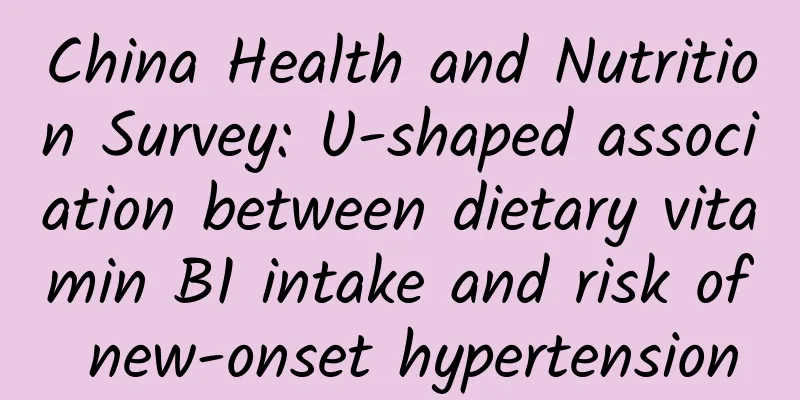China Health and Nutrition Survey: U-shaped association between dietary vitamin B1 intake and risk of new-onset hypertension

|
Vitamin B1 (thiamine) is a water-soluble vitamin that plays an important role in energy metabolism, anti-inflammation, and protection of endothelial function. Animal experiments have shown that vitamin B1 supplementation can lower the blood pressure of hypertensive rats. However, there has been no large-sample population cohort study exploring the relationship between dietary vitamin B1 intake and new-onset hypertension. A recent research paper published in the biomedical journal Nutrients found for the first time that the relationship between dietary vitamin B1 intake and the risk of new-onset hypertension is a U-shaped relationship , with the lowest risk of new-onset hypertension when the intake range is 0.76–1.13 mg/day . Professor Qin Xianhui from the National Clinical Research Center for Kidney Diseases of Nanfang Hospital and Liu Chengzhang from the School of Public Health of Anhui Medical University are the corresponding authors, and Dr. Zhang Yuanyuan is the first author. The study is a prospective cohort study based on data from the China Health and Nutrition Survey, which included 12,177 Chinese adults without baseline hypertension. Dietary vitamin B1 intake data were collected through 24-hour dietary recall and household food inventory for 3 consecutive days, and the cumulative mean of vitamin B1 intake represented its long-term exposure level. The average age of the population was 41.2 years old, and the median intake of dietary vitamin B1 was 0.93 mg/day. After 6.1 years of follow-up, 4,269 participants developed hypertension. The results showed that dietary vitamin B1 intake was associated with new-onset hypertension in a U-shaped manner . Compared with dietary thiamine intake in the 25%-75% quantile ( 0.76-1.13 mg/day ), the risk of new-onset hypertension in people with intakes below the 25% quantile and above the 75% quantile increased by 25% and 36%, respectively. The researchers pointed out that hypertension is a major public health problem worldwide and one of the main risk factors for cardiovascular disease. Therefore, it is of great clinical significance to identify more modifiable risk factors related to hypertension and promote the primary prevention of hypertension. The results of this study emphasize the importance of maintaining an appropriate level of vitamin B1 intake for the primary prevention of hypertension in the Chinese population . References: Zhang Y, Zhang Y, Yang S, Ye Z, Wu Q, Liu M, Zhou C, He P, Jiang J, Liang M, Wang G, Hou F, Liu C, Qin X. U-Shaped Relation of Dietary Thiamine Intake and New-Onset Hypertension. Nutrients . 2022 Aug 9;14(16):3251 Editor: Zhang Yuanyuan and Xiang Hao Reviewer: Qin Xianhui Reprint: Please contact us and indicate the source. |
>>: The barbecue season is coming, please keep this "healthy barbecue" guide
Recommend
Why do women cross their legs?
In modern society, people may not have too many r...
Things to note during the thirteenth week of pregnancy
It is the thirteenth week of pregnancy, and the p...
Girls should know the skills of wearing high heels!
High heels are a great way to increase women'...
Who is Luo Han Guo tea suitable for? Are there any side effects of drinking Luo Han Guo tea?
Monk fruit is a precious gourd plant unique to my ...
What kind of cucumbers are good for pickling cucumbers? Is it better to pickle water cucumbers or dry cucumbers?
We all know that there are many ways to cook cucu...
How to relieve adenomyosis dysmenorrhea
If women do not take proper care of themselves in...
What should I do if I find cervical polyps after pregnancy? Don’t panic, listen to what the doctor says
Recently, a pregnant woman with recurrent vaginal...
Headaches during late pregnancy
Headaches in the late pregnancy are a normal phys...
How to deal with postpartum urinary tract infection?
Women are prone to urinary tract infections after...
What medicine should I use for pubic lice?
Pubic lice is a common disease in life. When suff...
What are the health-preserving soups for women in autumn?
The weather in autumn is very dry, so we must pay...
What are the symptoms of menstruation after medical abortion?
When an unexpected pregnancy occurs and both part...
Spending tens of thousands of dollars to store umbilical cord blood, can it really save your baby's life at the critical moment?
This article was first published by Hunzhi (WeCha...
What is the reason for the foul smell of watery vaginal discharge?
Normal women have a small amount of white, odorle...
What causes lower back pain and bloody vaginal discharge during confinement?
Many female friends will suffer from back pain du...








![[Health Science] Supporting the "Hundred Million Project", we act in this way - Discussing the correct method of mastering blood sugar monitoring](/upload/images/67f0a461cfa27.webp)
